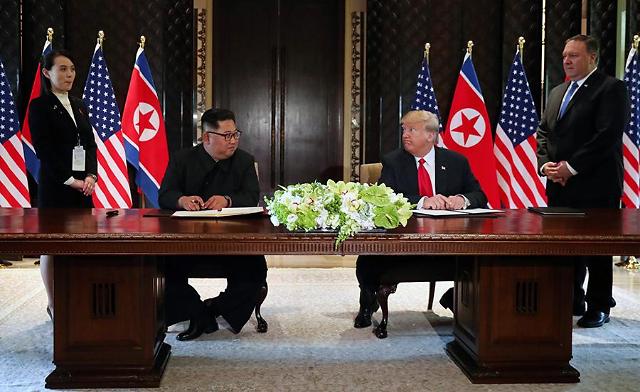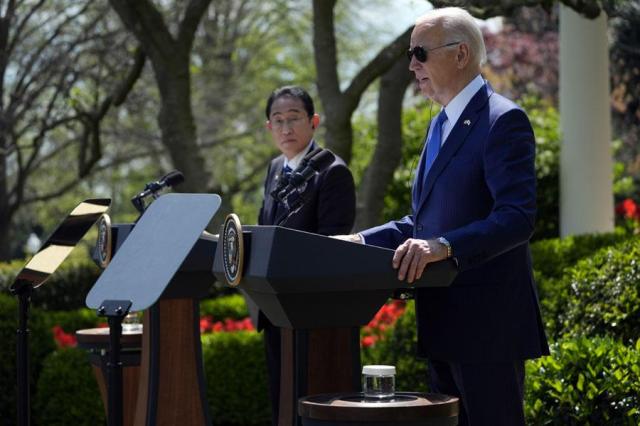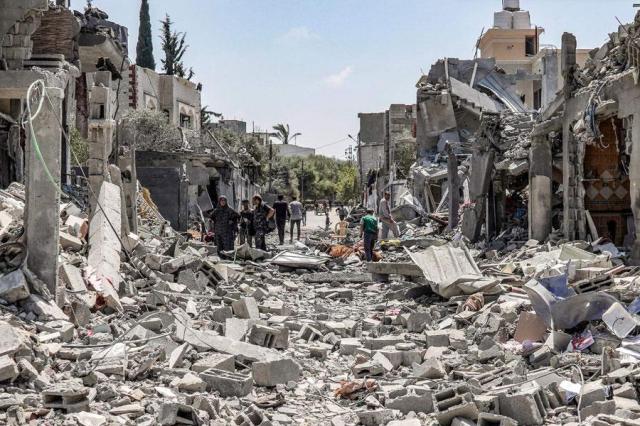
[REUTERS / Yonhap]
SEOUL -- The word "promise" brings excitement to our hearts. The preliminary meaning of the promise is to decide how to do things with another person or another party and to commit to doing it together. There is a wind in it that holds hope and expectation which also brings a thrilling sensation.
The key point of a promise is whether it was kept or not. If a promise is kept, mutual trust and satisfaction will rise but if not, sense of disappointment and betrayal will bring shock and confusion. The U.S.-North Korea summit in Singapore on Tuesday came on a rollercoaster of cancellation and implementation of promises. 65 years after the 1953 Korean Armistice Agreement, power games and psychological warfare are inevitable. Fortunately, I expect that the mission of peace will be completed and I hope that it will be a festival of the promise of the century.
The key to the summit meeting between U.S. President Donald Trump and North Korean leader Kim Jong-un is also a question of whether promises will be kept. It is a big deal between the U.S. CVID (Complete, Verifiable and Irreversible Dismantlement) and North Korea's CVI + G (Guarantee of Kim's regime). The big deal involves a "tug of war" that pushes and pulls to the last minute.
The U.S. is focusing on "economic CVIG", which promises North Korea's economic development through lifting sanctions, economic support from South Korea, Japan and China, and inducing private investment. North Korea is taking its place in the "Secure CVIG" which focuses on the establishment of a stable regime, peace treaty and diplomatic relations with the U.S. The two countries put a complete relationship normalization (CVI + Normalization) on the table of negotiation negotiations as a solution to fill the gap.
Selig Harrison (1927-2016), a U.S. expert on the Korean peninsula, proposed the CVIN to the North Korean leader Kim Il Sung during the first nuclear crisis in 1993. Harrison suggested the first North Korean chairman have his country become a normal nation by resolving the nuclear issue.
The peace negotiations between Northeast Asia and Northeast Asia, which came to light on the occasion of the inter-Korean summit between President Moon Jae-in and Kim Jong-un on April 27, led to a dialogue of the century in Singapore. Singapore is exquisite for the summit's venue as it has geopolitical advantages. Singapore also has historical experience leading China, a communist country, to reform and open up.
Singapore is a mentor of Shenzhen's Guangdong Province, planned by Chinese leader Deng Xiaoping, and a teacher of Shanghai, the city of the Great Wall. Deng, who was born in 1904, first met Lee Kuan Yew, Singapore's founding father, in Singapore in November 1978 when Lee was barely 19 years old. Then in 1992, during the Southern Talks, Deng took Singapore as China's role model. "Let's learn Singapore. We can do better," he said. Deng has kept the promise of reform and opening up 14 years after he received the advice from Lee.
President Kim Il Sung (1912-1994), the grandfather of Kim Jong-un, was reported to have kept close contacts with Deng and Lee. It is Singapore where Jang Song-thaek, Kim Jong-un's uncle, visited with an economic delegation in 2002 after visiting Seoul and Shanghai. Singapore is also a 21st-century dictatorship country controlled by a single party. The fact that Singapore is a "unique autocratic country" and an economic powerhouse with more than $ 50,000 per capita income, will also inspire Kim's idea of the Wonsan Special Economic Zone.
Singapore is a sort of "Lee family kingdom", similar to Kim's family ruling North Korea through three generations. Lee Kuan Yew's eldest son, Lee Hsien Loong, is the third prime minister of Singapore. Ho Ching, the chief executive officer of state-run investment organization Temasek, is Lee Kuan Yue's wife. It is the positioning of the political system that should be benchmarked by Kim Jong Eun.
Although Kim could find Singapore unfamiliar with him, the country has long been a diplomatic state with North Korea. Pyongyang and Washington carried out secret conversations here while they were in conflict. Before the first inter-Korean summit in 2000, Park Ji-won, former South Korean culture minister, secretly met North Korean special envoy in Singapore.
Some analysts believe that President Trump chose Sentosa Island as the venue for the summit is due to its geopolitical nature as well as its political neutrality and safety. It is also strange that the key axis of the US supremacy against China's One Belt One Road Initiative is the Taiwan - South China Sea - Singapore Line.
Despite China's complaints, Singapore continues military exchanges with Taiwan as well as with the U.S. This week, U.S. coastal bridges and maritime patrols were stationed near Sentosa Island. It is indeed a marvelous choice for the place of negotiations.
Because the U.S-North Korea summit was the big deal of the century, with the U.S. which induced the collapse of the Soviet Union in 1992 and North Korea, the forerunner of Soviet Marxist ideology, in the seats, it is hard to define where the talks have led to. Japanese Prime Minister Shinzo Abe and Russian President Vladimir Putin, as well as the Chinese president Xi Jinping, must all be calculating what the joint statement is leading to.
Brain games surrounding the fate of the Korean Peninsula are getting intensified. I hope that President Trump and Chairman Kim Jung-un to succeed in additional dialogues with the force and momentum to break through strong waves headed to them. Because It's the promise of all promises which everybody in the world dearly wants to see it kept.
This column was contributed by In Moon- ja, the publisher of Aju Business Daily.




